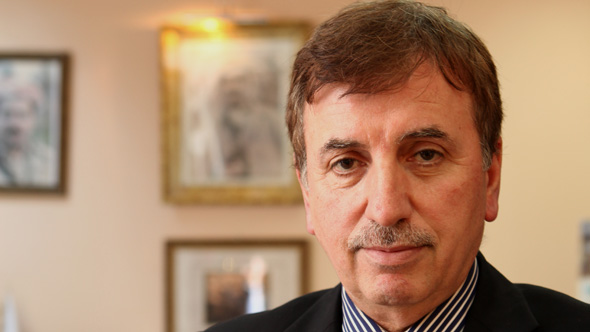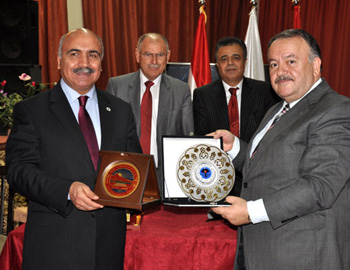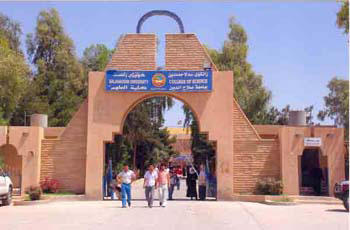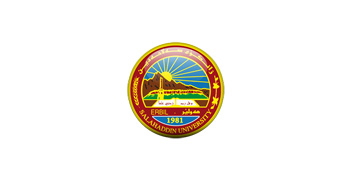Education in Kurdistan: Salahaddin University-Hawler
Dr. Mohammed R. Mochtar, Vice President for Administration and Finance Affairs at Salahaddin University-Hawler
Salahaddin University has a plan to reform its educational system and programs. A crucial part of this plan is to convince the private sector to make available and share their resources and so contribute to the reform of the educational system in the Kurdistan Region. Dr. Mochtar also stresses the importance of strong relations with other regional and international universities.
Interview with Dr. Mohammed R. Mochtar, Vice President for Administration and Finance Affairs at Salahaddin University-Hawler

Education is one of the most important pillars for sustainable economic growth; investment in young people. In your opinion, how is the attitude towards higher education in Kurdistan different from other neighboring countries? We know that Abu Dhabi is trying to bring many of the big players , Lebanon is another education hub…
Since 2003 education in Kurdistan improved at all educational levels, investors are being encouraged to invest in Kurdistan (on the basis of an Investment Law issued by the government of Kurdistan), and the banking system also improved. The results, among others, were: transparency in accounting system, public exposure of auditing mechanism, approach of an adequate transportation system, development of a communications system, and, last but not least, important steps had been made to reopen The Sulaymania University. Moreover, Salahaddin University was established in Erbil, and a lot of colleges are being created in all over Kurdistan, including international universities and colleges. Public universities have been opened and the people of Kurdistan have thus been given the opportunities to improve their education. Also, the majority of the people were given the chances to improve their economic status.
Also I have to mention that the Kurdistan Regional Government stepped forward to establish an adequate educational system for the people; to educate them so that they can become a productive part of our society.  We have a stable government and public institutions and we have a democracy, so people are free to participate in the governing process. An educated population is closely related to the issue of egalitarianism, to an establishment of firm structures governing our society and to adherence to the rule of law. We have reached a level of an educated and productive society tied with a strong confidence. Frankly speaking, none of our neighboring countries can compare to Kurdistan in this area.
We have a stable government and public institutions and we have a democracy, so people are free to participate in the governing process. An educated population is closely related to the issue of egalitarianism, to an establishment of firm structures governing our society and to adherence to the rule of law. We have reached a level of an educated and productive society tied with a strong confidence. Frankly speaking, none of our neighboring countries can compare to Kurdistan in this area.
What should be the priorities for the domestic reform in the education sector?
The Kurdistan Regional Government offers attractive investment opportunities in agriculture, electricity, banking, telecommunications, construction, education and training, energy, healthcare, professional services, oil and gas and tourism. Until now, there have been 339 project licenses issued in the Kurdistan Region, and these projects have generated almost $16 billion of investment. The confidence and faith of an international business person or an entrepreneur in the region is clearly growing, investors are reinvesting capital to rebuild the nation, thus strengthening our economy. Also, thanks to the security in place, the reforms taking place in Kurdistan should be strong and fast.
We as the leaders at the Salahaddin University have a plan to reform our system. The plan primarily depends on the aid and the use of this (foreign) aid to reform the educational system. It depends on convincing the private sector to share their resources and thus help to reform the educational system in Kurdistan.
Here I can announce that we are in a process of building a new modern campus for our University. The plan has been made, the design and construction tenders are being organized and a lot of foreign companies are participating in the process.
We have reached a level of an educated and productive society tied with a strong confidence. Frankly speaking, none of our neighboring countries can compare to Kurdistan in this area.
There are a lot of successful business models for universities, particularly in Sweden and Germany, where the private sector and universities have made joint ventures.
We approached and asked a lot of foreign companies to participate in this process. We were real happy with the results; many foreign companies showed their interest to participate in the tendering process for concept and detail design and construction project of the new campus of the Salahaddin University. The president of Salahaddin University, myself and the rest of the committee members decided to proceed forward with the project by cooperating with local and foreign companies in order to build this campus based on the European standards and design the buildings in a way that will fit the weather and environment here in Kurdistan.
As you said, Salahaddin University will be moving to a new campus. What is your vision for the University?
We are not moving yet, we are in the process of building a new campus. We have already designed it. We are about to begin the initial phase which will include the infrastructure, the presidency offices and two or three faculties.
What is the time frame?
We have to begin the initial phase before the end of 2012, so we will start soon. The whole project will take approximately 5 to 6 years.
What do you feel the major challenges are for the university? Is it the financing or bringing in international expertise or developing your own staff? What are the strategic and operational challenges?
First of all, I would like to thank the Prime Minister Nechirvan Barzani who provided our university with a lot of funds through oil deals, and, as far as I know, the same kind of help was given to all the universities and colleges in Kurdistan, whenever it was needed. Also, I cannot ignore the help from the Minister of Higher Education that strongly supported us. I would also like to thank a lot of people and friends who have been there for us whenever we were in need of support for the activities of our university.
Regarding expertise, we try to use the available expertise whenever available. We stay in touch with many international universities around the world with which we have had an excellent relationship. International experience is a guarantee for our success and progress with the reforms that aim to improve the education in Kurdistan.
I would like to highlight the importance of our staff, their experiences, capabilities and responsibilities when it comes to reformation of the education in Kurdistan. They have played a major role in this process. Also, I’m proud to say that our university – with the help provided by the Ministry of Higher Education and Ministry of Planning in Kurdistan – has been able to send about 2,000 students to study their Master and PhD degrees all over the world. Notably the United Kingdom, Germany, France and Scandinavian countries played an excellent role in the process of our reform and improvement, they deserve special thanks for their support in this regards. The scientific relationship to improve our staff qualification and broaden their knowledge has been always appreciated from our side. We have received great support when tackling various strategic and operational challenges and we have been provided with expertise to transform our University into an attractive place to work and live in for all our local and international staff.
What about the academic integration? We talked about the integration with Europe, how is it happening regionally and with other countries beyond Europe?
We consider ourselves to be still in the early stages, education programs should be further improved, we should develop relations with more experts and encourage them to come to Kurdistan, especially experts from the UK and Germany. We should ask them to advice us on how to improve and regularize the undergraduate and postgraduate study programs at Salahaddin University. We are in a great need of new partnerships with international universities.
We do have some of our students in Egypt and Turkey at the moment. We also have good relationships with universities in the Arab countries and we are in a process of establishing stronger relations with them. Hopefully we will succeed in this regard in near future.
Is this kind of cooperation planned?
It is planned and it will certainly happen. Hopefully, in near future we will build stronger relations and intensify our cooperation with international universities. We have already established some relations with the United Arab Emirates. The University of Dubai helped us to establish relations with different construction companies and we also have partner companies in Lebanon, Jordan and the UAE which are cooperating with us on some projects related to Salahaddin University.
Is financing a major issue for university in terms of education?
Our needs are being provided for by the KRG (Kurdistan Regional Government), we nevertheless need the private sector to cooperate with us in the reform process. The students in Kurdistan get dormitories free of charge (which makes $150 a month per student that needs to be paid by our University), this help continues after graduation until they are hired by the government or a local or international company. In fact, all the students in the universities of Kurdistan get the same kind of help – unlike in any other countries in the world where no such help is provided, except for loans.
Both the Ministry of Education and the Ministry of Higher Education get a huge budget but it is still not enough to improve the education system in a desired way. Thus we have to work with the education committee present in the Parliament in order to increase the budget for the years to come. We are also looking for other sources of income for our University. We start to cooperate with companies who work on projects in Kurdistan and we offer them to use our University Lab or we provide them with anything else they might need.
How do you see the future of the education sector itself? Do you believe in the future of education in Kurdistan?
Of course I do believe! Salahaddin University will keep on using all the sources provided to us and we will try to do our best in order to change and reform the system, we will try to improve our programs. Finally, I would like to end this conversation with “when there is a will there will be a success.”